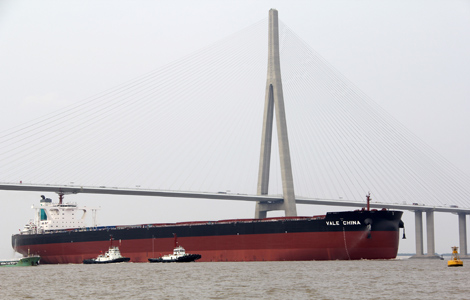Talks on mega-carrier access open in Brazil
Updated: 2012-02-15 10:01
By Zhou Siyu (China Daily)
|
|||||||||||
Vale China, a 400,000-ton bulk carrier used to ship iron ore and owned by Vale SA, a mining and metals corporation in Brazil, sails near a bridge in Changshu, Jiangsu province. To protect such ships and to ensure safety at ports, Chinese government authorities have denied them access to Chinese ports. [Photo / China Daily]

Brazil, China in negotiations on port restrictions for giant vessels
BEIJING - China and Brazil are negotiating access to Chinese ports for the fleet of giant vessels owned by the miner Vale SA.
The talks come as a result of China's tightened regulations on large carriers and signal that the issue has intensified at the political level.
During a meeting in the Brazilian capital, Brasilia, on Tuesday, the country's Vice-President Michel Temer discussed the issue of access for Vale's Valemax vessels - the world's biggest dry-bulk carriers - with China's Vice-Premier Wang Qishan, according to Marco Aurelio Garcia, foreign policy adviser to Brazilian President Dilma Rousseff.
"It will be dealt with at a political level," Garcia was quoted as saying, according to a report by Bloomberg.
On Jan 31, the Chinese Ministry of Transport tightened port regulations, a move that has effectively prevented Vale's mega-vessels from docking at ports in the country.
The ministry said its decision to bar giant ships was taken because of "maritime safety issues". Vale's Valemax vessels are designed to carry 400,000 metric tons of iron ore and are "too large for Chinese ports to accommodate", said Sun Guangqin, director of the Port and Shipping Institute at Dalian Maritime University.
"To tighten the regulations on giant vessels is necessary for the safe operation of ports and shipping routes," Sun said in a recent interview.
Analysts said the trade in iron ore between the two emerging economies is also a factor. In 2009, China replaced the United States as Brazil's largest trading partner. The total trade volume between the two countries jumped 16 percent to $77.1 billion last year. Iron ore, one of the South American country's main export commodities, plays an important role in Sino-Brazilian trade.
China, the largest consumer of iron ore, imported 686 million tons of the material in 2011, an increase of 10.9 percent from the previous year, according to data from Chinese General Administration of Customs.
Miners such as Vale might attain monopolies on the transportation of iron ore by setting up their own fleets, Zhang Shouguo, executive vice-president of the China Shipowners' Association, said.
"It (the monopoly) will hurt China's shipping industry as well as the steel industry," said Zhang.
Vale has invested $2.3 billion in 19 of the 400,000-ton giant bulk carriers and will control another 16 under long-term contracts, according to the company.
Scheduled for delivery by the end of 2013, the vessels will reduce freight costs from Brazil to China by between 20 and 25 percent and will significantly reduce carbon emissions compared with other vessels, Vale said.
The miner currently operates five Valemax vessels, but none has reached a Chinese port since being put into service in May.
In the meantime, Vale managed to unload its 388,000-ton Berge Everest at Dalian port on Dec 28, prompting protests from domestic shipping companies and the China Shipowners' Association.
Related Stories
COSCO cautious about purchase of carrier fleet 2011-11-08 10:55
China delivers its largest bulk carrier 2011-10-13 13:09
- Talks on mega-carrier access open in Brazil
- Beijing lends a hand to debt-ridden Europe
- New data system to prevent manipulation
- Freezing weather heats up demand for down products
- Stats go straight to national database
- Biological industry development plan got
- Factory caught using child labor
- VC, PE firms show appetite for food industry









